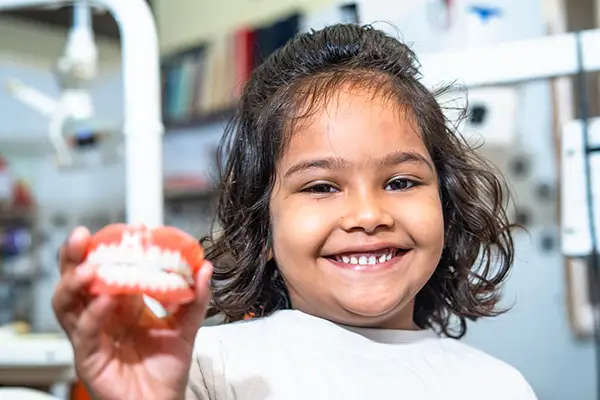Early Childhood Caries Prevention & Treatment
 Early childhood caries (ECC) is one of the most prevalent chronic conditions affecting young children today. Often referred to as “baby bottle tooth decay,” early childhood caries can begin soon after the first teeth erupt and rapidly progress if left untreated. At Arlington Pediatric Dentistry, our pediatric dental team in Arlington, WA is committed to helping parents and caregivers understand, prevent, and treat ECC before it leads to more serious oral health issues. Early childhood caries (ECC) is one of the most prevalent chronic conditions affecting young children today. Often referred to as “baby bottle tooth decay,” early childhood caries can begin soon after the first teeth erupt and rapidly progress if left untreated. At Arlington Pediatric Dentistry, our pediatric dental team in Arlington, WA is committed to helping parents and caregivers understand, prevent, and treat ECC before it leads to more serious oral health issues.
What Is Early Childhood Caries?
Early childhood caries refers to tooth decay occurring in children under the age of six, particularly affecting the upper front teeth. However, it can spread to other teeth quickly without intervention.
The primary cause is frequent exposure to sugary liquids like milk, juice, or formula—especially when consumed from a bottle or sippy cup at bedtime. Bacteria in the mouth feed on these sugars and produce acids that weaken tooth enamel.
While baby teeth are temporary, they play a vital role in speech development, proper chewing, and holding space for permanent teeth. That’s why early intervention is essential.
Signs and Stages of ECC
Recognizing the early signs of ECC helps in timely treatment. These indicators range from subtle discoloration to severe dental damage:
| • |
White Spots - The first visible sign, usually appearing near the gum line.
|
| • |
Brown or Black Pits - As decay worsens, cavities appear, often on the upper front teeth.
|
| • |
Pain or Discomfort - Irritability, avoidance of certain foods, or visible distress while chewing.
|
| • |
Visible Tooth Damage - In advanced stages, the teeth may break down completely or become abscessed. |
If any of these symptoms are observed, it's important to seek pediatric dental care immediately to prevent further progression.
Preventing Early Childhood Caries
The good news is that ECC is highly preventable with proactive oral health habits starting in infancy. Here are key prevention strategies:
| • |
Avoid Bedtime Bottles - Never put your child to bed with milk, formula, juice, or any sweetened drink.
|
| • |
Introduce Cup Drinking Early - Begin weaning off the bottle by the first birthday.
|
| • |
Limit Sugary Snacks & Drinks - Reduce frequency and amount of sugary foods and beverages.
|
| • |
Clean Gums and Teeth - Gently wipe the gums after feedings and start brushing as soon as the first tooth erupts.
|
| • |
Fluoride Use - Use a tiny smear of fluoride toothpaste once teeth appear and follow your dentist’s fluoride recommendations.
|
| • |
Regular Dental Visits - Schedule the first dental visit by age one and continue regular checkups every six months. |
Creating a routine of good oral hygiene and dietary habits early on sets the foundation for lifelong dental health.
Treating Early Childhood Caries
When ECC develops, prompt treatment is essential to avoid pain, infection, and disruption of tooth development. Treatment options depend on the severity of the decay:
| • |
Fluoride Treatments - Applied in-office to help remineralize early lesions.
|
| • |
Dental Fillings
- Used to restore minor to moderate cavities.
|
| • |
Crowns for Baby Teeth - Stainless steel or tooth-colored crowns may be placed for extensive decay.
|
| • |
Tooth Extractions - In severe cases, removal may be necessary if the tooth cannot be saved.
|
| • |
Sedation Dentistry - Safe, child-friendly sedation options may be offered for comfort during procedures. |
Our pediatric dental team in Arlington prioritizes gentle, conservative care tailored to your child’s age and needs.
Why Choose Our Arlington Pediatric Dental Office?
At Arlington Pediatric Dentistry, we understand the unique challenges that come with caring for young smiles. Families in Arlington trust us for expert care and a compassionate, child-friendly environment.
| • |
Specialized Pediatric Expertise - Our dental team is trained in diagnosing and treating conditions like ECC.
|
| • |
Kid-Centered Care - Our gentle, engaging approach helps kids feel comfortable during every visit.
|
| • |
Preventive Focus - We equip parents with the tools and knowledge to protect their child’s oral health.
|
| • |
Modern Technology - Advanced diagnostic tools ensure early detection and precise treatment. |
Our goal is not only to treat cavities but also to educate and empower families to prevent them altogether.
FAQs
What causes early childhood caries (ECC)?
Early childhood caries is primarily caused by frequent and prolonged exposure to sugary liquids like milk, formula, or juice—especially when given in bottles or sippy cups at bedtime. These sugars feed bacteria in the mouth, which then produce acids that erode tooth enamel.
How can I prevent my child from developing ECC?
To prevent ECC, avoid putting your child to bed with bottles containing anything other than water, begin brushing as soon as the first tooth erupts, introduce cup drinking by age one, limit sugary snacks and drinks, and schedule your child’s first dental visit by their first birthday.
What are the early signs of ECC I should look for?
Early signs of ECC include white spots near the gum line, which may progress to brown or black pits in the teeth. Other symptoms include pain, sensitivity, irritability, or visible damage to the tooth structure. Early detection is key to effective treatment.
Does my child need treatment for baby teeth if they are just going to fall out?
Yes, treating baby teeth is important because they help with speech development, proper chewing, and guiding the permanent teeth into place. Untreated decay can lead to pain, infection, and long-term dental issues.
What treatment options are available for children with ECC?
Treatment options vary based on severity and may include fluoride treatments, fillings, crowns, extractions, or sedation dentistry. At Arlington Pediatric Dentistry, we offer personalized care designed to keep your child comfortable and safe throughout treatment.
When should my child first see a dentist to help prevent ECC?
Your child should have their first dental visit by their first birthday or within six months of their first tooth erupting. Regular checkups every six months help monitor development and catch early signs of tooth decay before they become serious. |

 Early childhood caries (ECC) is one of the most prevalent chronic conditions affecting young children today. Often referred to as “baby bottle tooth decay,” early childhood caries can begin soon after the first teeth erupt and rapidly progress if left untreated. At Arlington Pediatric Dentistry, our pediatric dental team in Arlington, WA is committed to helping parents and caregivers understand, prevent, and treat ECC before it leads to more serious oral health issues.
Early childhood caries (ECC) is one of the most prevalent chronic conditions affecting young children today. Often referred to as “baby bottle tooth decay,” early childhood caries can begin soon after the first teeth erupt and rapidly progress if left untreated. At Arlington Pediatric Dentistry, our pediatric dental team in Arlington, WA is committed to helping parents and caregivers understand, prevent, and treat ECC before it leads to more serious oral health issues.